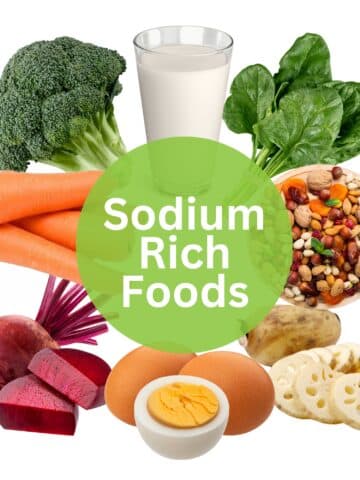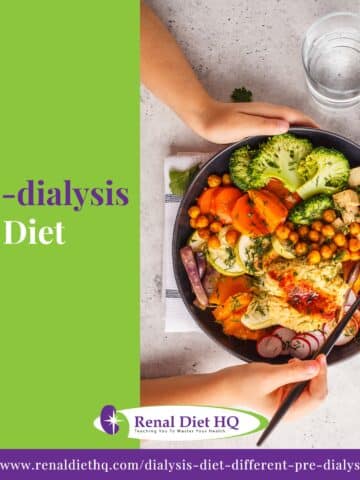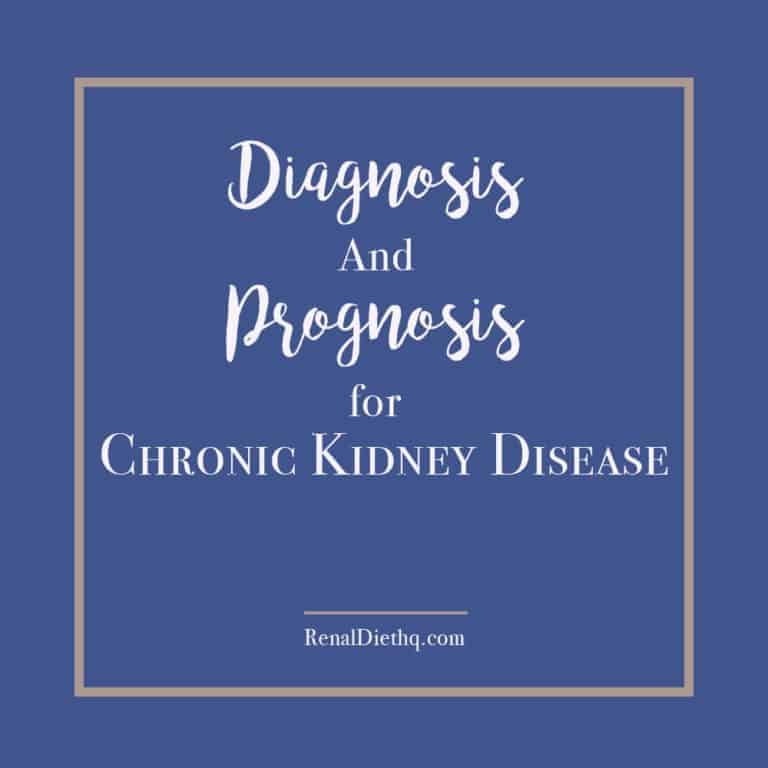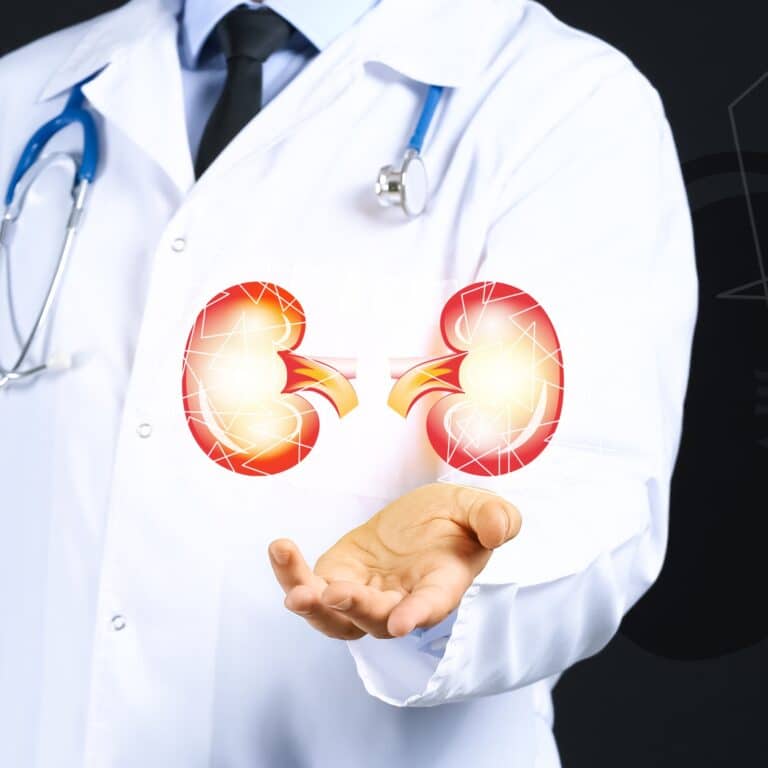Avoid End Stage Renal Disease
You're in control of your kidney health. Understanding end stage renal disease isn't just important, it's crucial. By adjusting dietary habits and lifestyle, you can significantly reduce your risk.
Don't wait until dialysis or transplant are your only options - take active steps now to protect your kidneys. Remember, prevention is always better than cure.
Stay informed, stay vigilant and most importantly, stay healthy, while dealing with Chronic Kidney Disease. End-state renal (kidney) disease is something you can still manage with the right tools. If you ever have questions, please reach out to your health professional team.
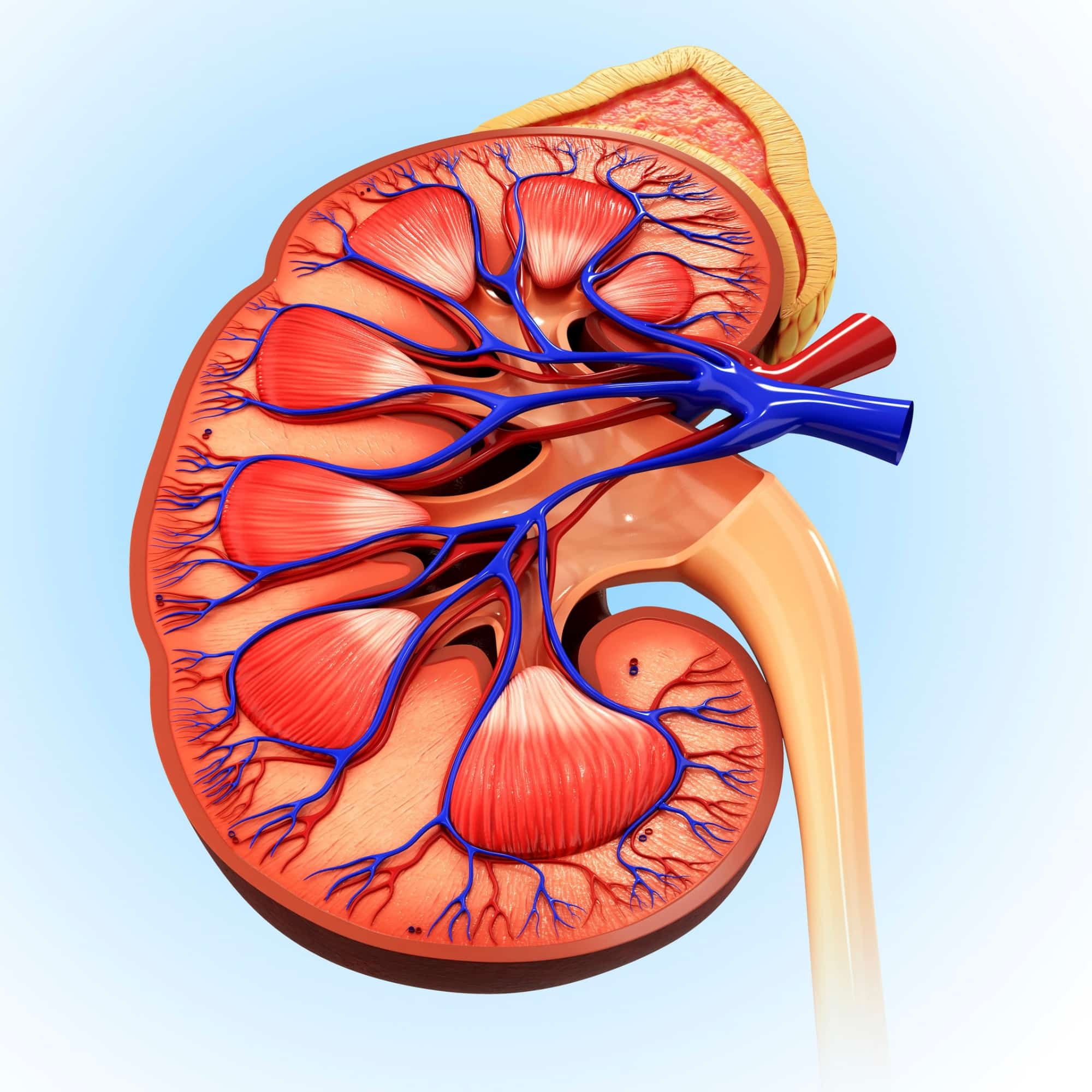
Jump to:
- Key Takeaways
- Understanding End Stage Renal Disease
- The Impact of Dietary Habits on Kidney Health
- Lifestyle Modifications for Healthy Kidneys
- Comprehensive Care for Kidney Disease
- Steps to Prevent Dialysis and Transplant
- Importance of Regular Check-ups and Monitoring
- Causes and Risk Factors of End Stage Renal Disease
- Recognizing Symptoms of Kidney Disease
- Consequences of Neglecting Kidney Health
- Frequently Asked Questions
- Be Proactive In Avoiding End Stage Renal Disease
Key Takeaways
- Understanding the progression and symptoms of renal disease is crucial for early detection and intervention.
- Genetic predisposition, family history, diabetes, hypertension, and autoimmune disorders are all factors that can contribute to the onset of renal disease.
- Making kidney-safe food choices, monitoring sodium intake, balancing protein consumption, and maintaining adequate hydration are important dietary habits for kidney health.
- Regular physical activity, avoiding alcohol consumption and smoking, and maintaining a healthy weight are lifestyle modifications that can promote healthy kidneys and reduce the risk of end-stage renal disease.
Understanding End Stage Renal Disease
You're about to have an important conversation regarding the progression and symptoms of renal disease, a condition that affects millions globally.
Understanding the root causes of this debilitating illness is critical for both prevention and treatment strategies.
As we explore this topic, you'll gain insights into how the disease develops over time, its telltale signs and symptoms, as well as factors contributing to its onset.
For More Recipes and Ideas --->> Get Your Free Meals and Recipes That Are Perfect for Pre-Dialysis Diets, Pre-Dialysis with Diabetes, or Dialysis Diets.
Disease Progression and Symptoms
It's crucial to understand the progression of renal disease and its symptoms to take timely action.
Educate yourself about renal failure genetics. Knowing your family history can help you assess your risk level. Don't fall for renal disease myths that downplay the role of genetics.
Learn about kidney disease misconceptions. Misinformation can hinder effective treatment and prevention strategies. Ensure you're equipped with accurate knowledge.
Explore alternative treatment options. It's important to consider all available treatments, not only conventional ones, before deciding what's best for you or a loved one.
Additionally, consider the psychological impact analysis as coping with any chronic illness is mentally taxing. It's essential to address these issues alongside physical health concerns.
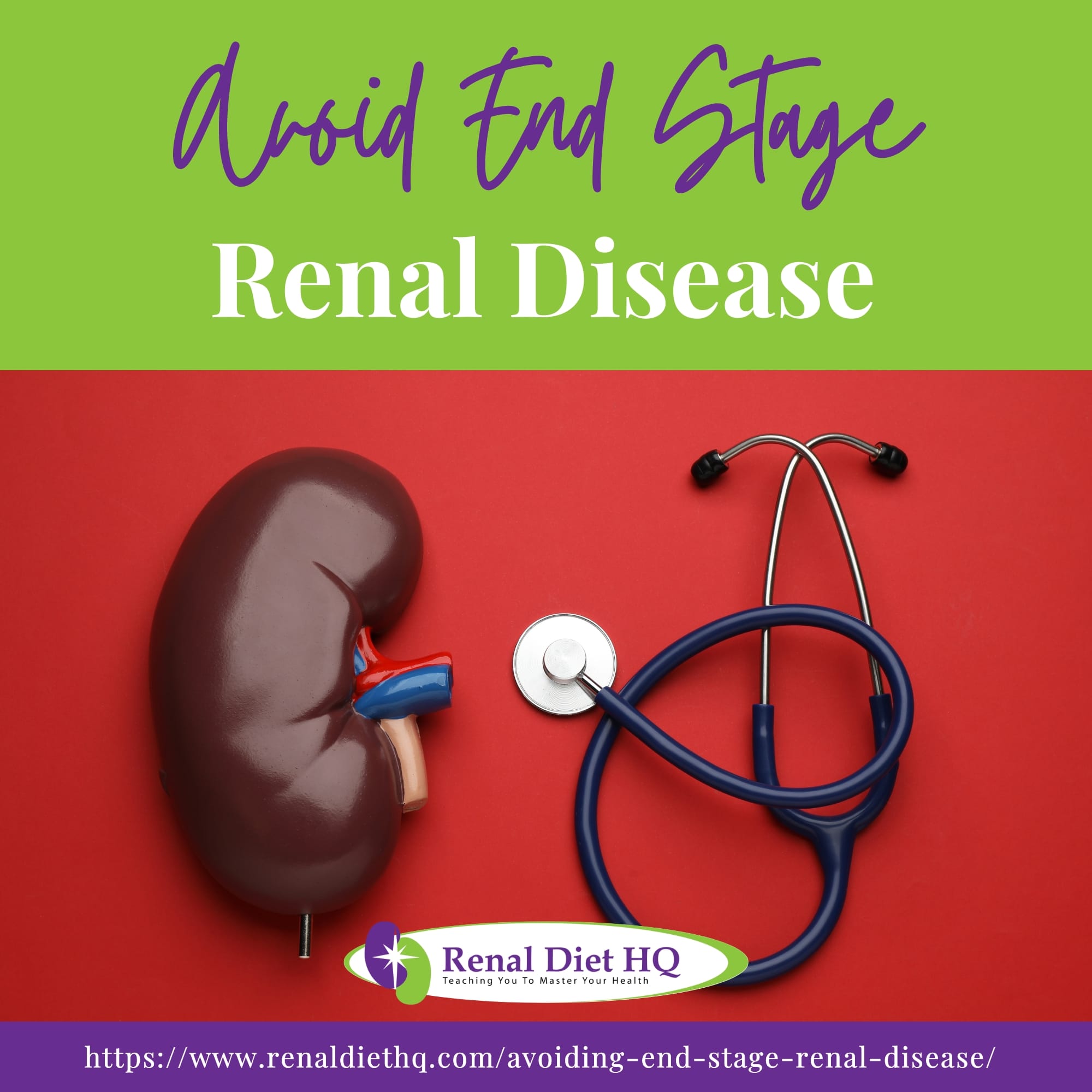
Causes of Renal Disease
Understanding what triggers kidney disorders can help you better manage and potentially prevent the problem. Genetic predisposition plays a significant role. If your family has a history of renal diseases, you're at a higher risk. But that's not the only cause.
There's also a strong diabetes connection to kidney disease; uncontrolled blood sugar levels can damage kidneys over time, reducing their ability to filter waste from your blood efficiently. Hypertension correlation is another critical factor as high blood pressure can stress and weaken your kidneys. Autoimmune disorders like lupus may lead to inflammation and kidney damage too.
The Impact of Dietary Habits on Kidney Health
You've likely heard that a well-balanced diet plays an integral role in maintaining overall health. But did you know it's also crucial for kidney health? Making kidney-safe food choices can significantly lower your risk of developing kidney-related issues on the renal diet.
In this discussion, we'll explore how diet contributes to preventing renal diseases and explore the best food options for keeping your kidneys healthy on a kidney-friendly diet.
Kidney-Safe Food Choices
Choosing kidney-safe foods can significantly help in managing kidney disease and delaying its progression to end-stage renal disease. Understanding your body's needs for hydration, the role of herbal supplements, the importance of monitoring sodium intake, protein consumption, and calcium management is crucial.
Here is a guide:
- Hydration Importance:
- Drink adequate water but avoid overhydration.
- Herbal Supplements:
- Use with caution; some may harm your kidneys.
- Sodium Intake:
- Limit your sodium to control blood pressure.
- Protein Consumption:
- Consuming appropriate levels aids kidney function.
- Calcium Management:
- Balance intake to maintain bone health without overloading kidneys.
In serving others with these conditions, you're not just providing a meal, you're potentially prolonging their life. Whether you're on dietary treatment, dialysis diet, or the kidney diet, these tips are super helpful!
Diet's Role in Prevention
In managing your health, it's crucial to realize how diet plays a pivotal role in preventing kidney issues. It starts with balancing your protein intake. Too much can overwork the kidneys while too little may compromise your health.
Limiting your salt consumption is key as excessive amounts can lead to high blood pressure, a serious risk factor for kidney ailments.
Hydration importance cannot be overstated, drinking enough water helps flush out toxins that might otherwise strain the kidneys. Remember that extra fluid can be an issue if you have a daily intake to pay attention to.
Vitamin intake also aids in maintaining overall kidney health, with particular emphasis on vitamins B6 and C.
The amount of salt you consume is also important. Whether it's lite salt, table salt, or you have to watch the amounts of salt in your foods, this is an important role in prevention. Too much salt can cause an even greater decline in Kidney Function.
Lastly, detox diets often promise quick results but they could put undue stress on your kidneys if not done responsibly. Always consult professionals before starting such diets.
Lifestyle Modifications for Healthy Kidneys
In the quest to maintain healthy kidneys, it’s time to focus towards the influence of lifestyle choices. These choices include exercise, alcohol consumption, and smoking.
You might wonder how these factors interact with your kidney health. This discussion will contain insights about the positive impact that regular physical activity can have on your kidneys. It will also cover the potential damage that alcohol and smoking may inflict on these crucial organs.
Exercise Impact on Kidneys
You'll find that regular exercise can significantly improve your kidney health and potentially delay the onset of end stage renal disease. It's important to understand the specific Exercise Benefits, Hydration Importance, Physical Activity Frequency, Exercise Intensity, and Kidney Friendly Workouts for this purpose.
Exercise Benefits:
- Enhances blood flow to kidneys
- Helps control blood pressure
- Aids in maintaining a healthy weight
Hydration Importance:
- Ensures proper functioning of kidneys
- Facilitates removal of toxins
Physical Activity Frequency & Exercise Intensity:
- Regular moderate-intensity activity is beneficial
- High intensity workouts should be done under medical supervision
All of these tips can help while dealing with end-state kidney disease.
Alcohol, Smoking, and Kidneys
Shifting gears now, let's look into how habits like alcohol consumption and smoking can affect your kidney health. Alcohol's renal effects are profound, leading to increased risk of chronic kidney disease. Tobacco toxicity resulting from smoking can cause smoking's nephrotoxicity, damaging the kidneys over time with kidney failure.
If you're looking to serve others by promoting healthy habits, consider emphasizing the importance of alcohol detoxification and smoking cessation to help people with kidney disease.
| Habit | Impact on Kidneys |
|---|---|
| Alcohol Consumption | Alcohol's renal effects include altered kidney function, fluid imbalances, and risk for chronic disease |
| Smoking | Tobacco toxicity contributes to smoking's nephrotoxicity, causing harm to kidney cells |
| Detoxification from Alcohol | Crucial for reversing some of alcohol's negative renal impacts |
| Smoking Cessation | Essential in halting further damage caused by tobacco toxicity |
Influencing individuals towards these healthier choices could significantly reduce the number of people suffering from end-stage renal disease. Make sure you are also paying attention to cholesterol levels, dialysis treatment, and salt substitutes.
Comprehensive Care for Kidney Disease
In managing kidney disease, it's crucial that you understand the importance of monitoring your treatment progress and the role of medications in your overall care plan.
Regular check-ups and tests aren't just routine; they're essential tools for assessing how well you're responding to treatment and whether any adjustments are necessary.
Similarly, understanding how your prescribed medications work can empower you to take an active part in maintaining the health of your kidneys.
Monitoring Treatment Progress
Keeping an eye on your treatment progress is crucial in preventing end stage renal disease. It's paramount that you follow the treatment plan, track your progress diligently, make necessary therapy adjustments, and educate yourself about the disease.
Here are some key points to consider:
- Treatment Adherence
- Never skip medications.
- Always follow dietary restrictions.
- Progress Tracking
- Regularly monitor blood pressure and kidney function tests.
- Attend all scheduled medical appointments.
- Therapy Adjustments
- Be open to changes based on how your body is responding to the treatment.
- Patient Education
- Understand why adherence is critical.
- Learn about potential outcomes if left untreated.
Role of Medications
You'll find that medications play a vital role in managing your kidney health and slowing down the progression of the disease. However, medication adherence is crucial; missing doses can worsen your condition. Beware of drug interactions as they can cause detrimental effects. Side effects management also plays a key role in ensuring you comfortably continue with your treatment.
Prescription modifications are sometimes necessary to adapt to changes in your health status. Non-prescription risks should not be overlooked, as over-the-counter drugs can interact negatively with your prescribed regimen.
| Medication Adherence | Drug Interactions | Side Effects Management |
|---|---|---|
| Crucial for disease control | Can worsen conditions | Key for treatment adherence |
| Missed doses have consequences | Prescription & non-prescription risks | Prescription modifications may help |
| Regular check-ups ensure compliance | Always consult before adding/removing drugs | Report discomfort promptly |
Steps to Prevent Dialysis and Transplant
You're about to delve into a crucial discussion on preventative measures that can keep you far from the need for dialysis or transplant.
The focus is twofold. Effective dietary modifications and the importance of regular exercise.
You'll learn what changes to make, but also why they're essential in maintaining your kidney health and overall well-being.
Effective Dietary Modifications
Incorporating effective dietary modifications can significantly help in preventing end stage renal disease. You're not alone in this fight, and here are some guidelines you can stick to:
- Dietary Supplements: These can bridge nutritional gaps, but make sure they're physician-approved.
- Nutritional Education: Understanding your nutritional needs can empower you to make healthier choices.
- Attend workshops
- Fluid Intake: Stay hydrated, but be mindful of quantity as too much fluid can overload your kidneys.
- Sodium Restriction: Lower salt intake helps control blood pressure and reduces kidney strain, while on the kidney diet.
- Phosphorus Control: High phosphorus levels harm the kidneys. Limit foods rich in this mineral due to end-state kidney disease.
Importance of Regular Exercise
It's equally crucial to maintain a regular exercise routine for overall health and well-being. Exercise benefits span across physical, mental, and emotional domains. Incorporating fitness regimes into your daily schedule enhances cardiovascular health, aids in weight management, and boosts your immune system.
Your workout frequency should ideally be moderate to vigorous physical activity for at least 150 minutes per week. This could include aerobic exercises like walking, jogging, or cycling which are known to enhance heart function and improve circulation.
Importance of Regular Check-ups and Monitoring
You're well aware of how vital your kidneys are to your overall health. That's why it's important to incorporate routine health assessments into your lifestyle, with a particular focus on monitoring kidney function.
Routine Health Assessments
Regular health check-ups cannot be underestimated when it comes to avoiding end-stage renal disease. Your healthcare accessibility, insurance coverage, and family support role are crucial factors in maintaining these regular assessments.
- Healthcare Accessibility
- Regular appointments
- Prompt treatment initiation
- Insurance Coverage
- Adequate plans
- Required medical services coverage
- Family Support Role
- Emotional backing
- Assistance with medical appointments
Don't overlook the mental health impact that a diagnosis like this can have; it's essential you're proactively managing your stress levels. Also, remember genetic predispositions play a part in your risk level.
Routine checks aren't just an option, they're a necessity in early detection and prevention of severe conditions such as end-stage renal disease.
Monitoring Kidney Function
Having understood the importance of routine health assessments, let's now focus on monitoring kidney function specifically.
Kidney biopsies often play a critical role in diagnosing renal diseases early, so you can take preventative measures.
Hydration impact shouldn't be underestimated either; maintaining proper fluid balance aids in toxin elimination and overall kidney health.
If you're dealing with diabetes, strict control is vital as high blood sugar levels may damage these organs over time.
Hypertension management also forms an integral part of preserving your kidneys' well-being, since uncontrolled high blood pressure can lead to end-stage renal disease.
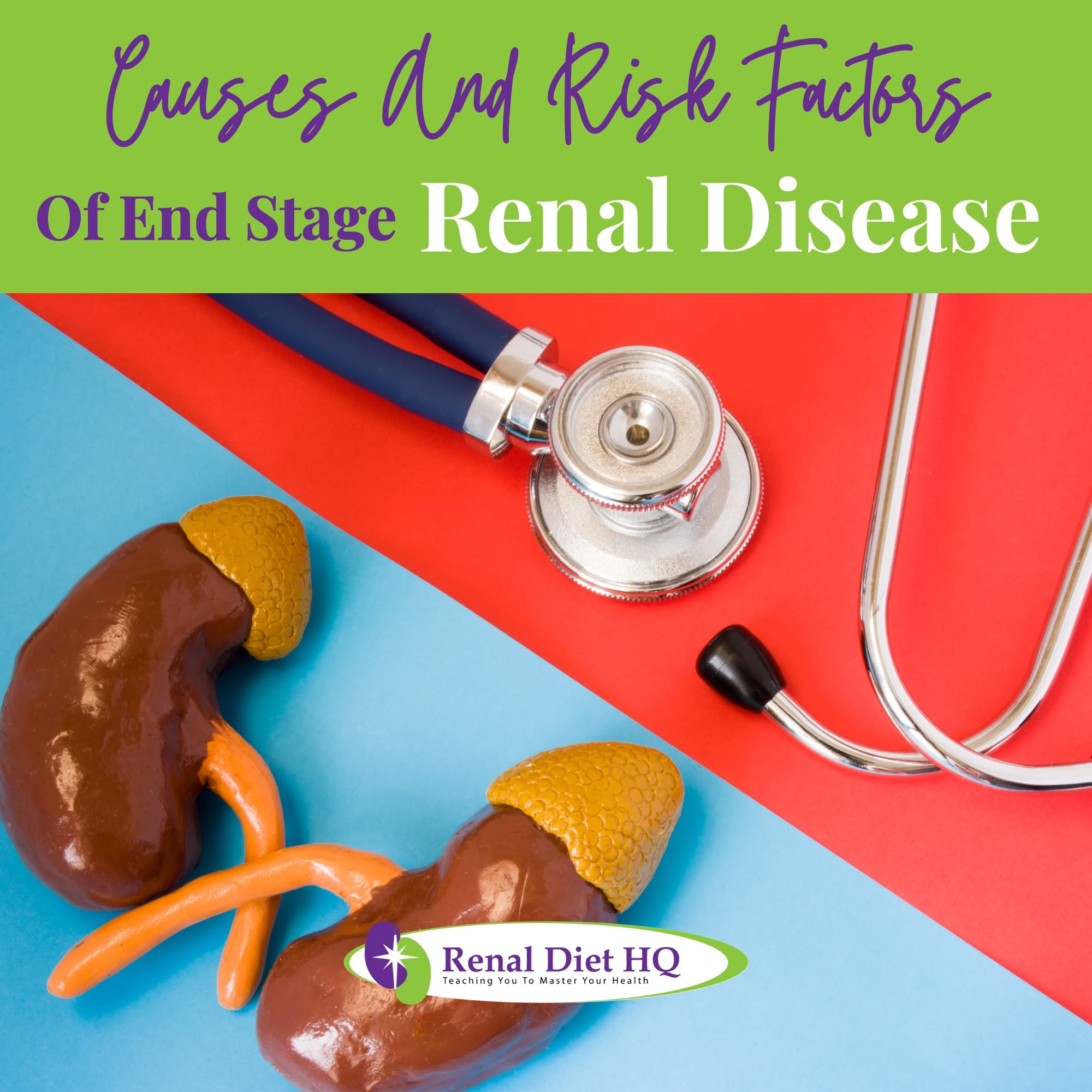
Causes and Risk Factors of End Stage Renal Disease
In this discussion, you'll gain a deeper understanding of the causes and risk factors leading to end stage renal disease (ESRD), as well as preventative measures against kidney damage.
It's crucial for you to identify potential risk factors early on to mitigate their effects and take necessary precautions.
We'll also delve into effective strategies aimed at preventing kidney damage, which can significantly reduce your chances of developing ESRD.
Identifying Risk Factors
You'll need to understand your risk factors for developing end stage renal disease to effectively avoid it. These include:
- Genetic predisposition: If kidney disease runs in your family, you're at higher risk. Regular screening is essential if this is the case.
- Diabetes management: High blood sugar can damage your kidneys over time. Proper control of diabetes reduces this risk.
- Hypertension control: Uncontrolled high blood pressure harms the kidneys too. Keeping hypertension under check prevents such damage.
- Obesity repercussions: Being overweight increases strain on your kidneys. Working towards a healthy weight can alleviate this strain.
- Immune system disorders: Conditions like lupus affect the immune system and can lead to kidney disease. Early diagnosis and treatment are crucial here.
Knowing these risks empowers you to take proactive steps for prevention.
Preventing Kidney Damage
To protect your kidneys from potential damage, it's crucial to manage these risk factors effectively. This includes kidney hydration, stress management, understanding genetic influences, blood pressure control, and diabetes management.
| Kidney Protection Strategies | Description |
|---|---|
| Kidney Hydration | Ensure you're drinking enough water daily to keep your kidneys well hydrated and functioning properly. |
| Stress Management | Incorporate relaxation techniques like yoga or meditation into your routine to reduce the impacts of stress on your body. |
| Genetic Influences | Understand any genetic predispositions you may have towards kidney diseases by consulting with a healthcare professional. |
Effective blood pressure control is vital for reducing the risk of kidney damage while managing diabetes can prevent complications that could lead to kidney disease. You're serving not just yourself but others too by maintaining good health practices!
Recognizing Symptoms of Kidney Disease
In the journey to maintain your kidney health, identifying early disease signs is crucial. You'll learn not only how to spot these initial indicators, but also understand symptom progression as the disease advances.
It's a critical step forward in managing your health effectively and proactively addressing any potential kidney issues.
Identifying Early Disease Signs
Spotting the early signs of kidney disease can help you avoid reaching end stage renal disease. As someone who's dedicated to serving others, understanding these indicators is crucial.
- Genetic predispositions: If there's a history of kidney disease in your family, you're at risk. Encourage your loved ones to get screened regularly.
- Kidney stone risks: Frequent kidney stones might be a sign. Ensure those under your care stay hydrated and maintain a balanced diet.
- Diabetes complications: High blood sugar levels can damage kidneys over time. Monitor glucose levels meticulously.
- Hypertension effects: Uncontrolled high blood pressure can cause kidney damage. Keep an eye on those BP readings.
- Autoimmune disorders: Diseases like lupus can affect the kidneys. Stay vigilant if caring for autoimmune patients.
Understanding Symptom Progression
It's essential to grasp how symptoms of kidney disease on the renal diet can progress over time, affecting the overall health and well-being of patients. As someone serving others, your role in progression tracking is vital.
With symptom awareness, you can identify subtle changes that may signal worsening conditions. Early detection is key, it enables intervention before irreversible damage occurs.
Patient education plays an invaluable part too. By informing patients about their condition and risk awareness, they're empowered to participate actively in their care management. They'll understand the importance of regular check-ups and lifestyle modifications, further preventing disease progression.
Consequences of Neglecting Kidney Health
You're about to jump into a critical discussion on the consequences of neglecting kidney health. This discussion will focus on the health risks involved and oft-ignored preventive measures.
Ignoring early symptoms can lead to severe complications. It's imperative to take those warning signs seriously.
You'll also discover how simple preventive steps, when overlooked, can pave the way for irreversible damage to your kidneys.
Health Risks Involved
Understanding the health risks involved in end stage renal disease is crucial for you, as it'll help manage your condition and prevent complications. There are several factors that can increase your risk of end stage on the renal diet.
- Genetic predisposition: You're more likely to develop this condition if it runs in your family.
- Importance of genetic counseling
- Family history of kidney diseases
- Obesity correlation and Hypertension effects: Being obese can put strain on your kidneys, leading to hypertension.
- Weight management strategies
- Regular blood pressure checks
- Diabetes complications and Autoimmune disorders: Both conditions can damage the kidneys over time, leading to renal disease.
- Regular check-ups for diabetes patients
- Monitor autoimmune disorders closely
Other things to pay attention to include blood vessels, blood cells, blood tests, waste products and so much more. Your health is important and all of these aspects help add up to keeping you healthy.
Too Much Extra
One thing about end state renal disease is that you have to pay attention to what is "too much extra."
- Extra sodium
- Extra phosphorous or excess phosphorus
- Extra Iron
- Extra potassium
- Excess fluid
- Extra calcium
Preventive Measures Ignored
Despite knowing the risks, many individuals don't take the necessary preventive measures.
Neglected hydration is a common oversight that can lead to kidney damage over time. You're encouraged to drink enough water each day to aid in toxin removal and maintain optimal kidney function.
Ignored stress management can indirectly impact your renal health through poorly controlled hypertension and diabetes. Overlooked hypertension or mismanaged diabetes, if left unchecked, may cause irreversible harm to your kidneys.
Unchecked obesity also poses considerable strain on these organs. By implementing proper nutrition, regular exercise, adequate hydration, and effective stress management strategies into your daily routine, you can safeguard yourself against end stage renal disease and serve as an inspiration for others to prioritize their health too. Always make sure you talk to your health care provider about any questions you may have.
Always pay attention to food labels, potassium levels, and daily food choices because that's what's going to help you most in the long run.
What are some things that people struggle with because of end-stage renal disease that they ignore? Peritoneal Dialysis, Bone Disease, Heart Failure, Electrolyte Levels, and so much more.
Frequently Asked Questions
Living with end stage renal disease can significantly impact your psychological health. You're likely to experience depression, anxiety, and stress. Managing these emotions is crucial for maintaining mental resilience.
Depression management techniques may include medication or therapy. Coping with anxiety often involves relaxation strategies, while stress reduction could involve lifestyle changes.
Therapy offers numerous benefits in this situation, providing tools to build psychological strength and improve quality of life.
As a family member or friend, you're instrumental in aiding your loved one with end stage renal disease. Encourage dietary adjustments and regular exercise regimes to maintain health.
Explore treatment options together and assist with financial planning for medical costs.
Provide emotional support during this challenging time, helping them cope psychologically. Your unwavering presence and understanding can make a significant difference in their journey through this difficult condition.
Another way your family and friends can support someone with end stage renal disease is by helping them with the right foods. It gets tricky when you try to eat things like frozen meals, cream soda, frozen dinners, and frozen pizza. You really have to help friends and family with end-stage kidney disease to focus on their health.
You're asking about new or experimental treatments for end stage renal disease. There's an exciting wave of research being conducted right now.
Innovations like stem cell therapy, gene editing techniques, and nanotechnology applications are all being explored. Scientists are even working on the development of artificial kidneys!
Also, a personalized medicine approach is becoming increasingly popular in treating this disease. The medical field is making great strides to help those suffering from this condition.
End stage renal disease can significantly affect your fertility and pregnancy. You're likely to experience challenges conceiving and may need fertility treatments.
Pregnancy complications can occur, putting both maternal health and neonatal outcomes at risk. Doctors often recommend specific contraception methods to prevent pregnancy while managing the disease.
It's crucial to discuss these issues with your healthcare provider for a comprehensive understanding of your situation and potential solutions.
Of course, it depends on the type of dialysis you're on or other factors for kidney disease. Sometimes end state renal disease does affect pregnancy and fertility.
Be Proactive In Avoiding End Stage Renal Disease
It's crucial to maintain healthy kidneys. By adopting a balanced diet and making lifestyle changes, you can help prevent end stage renal disease. Regularly monitoring your health is also important in this regard, especially for people with diabetes can also relate.
Don't overlook the importance of recognizing symptoms and seeking comprehensive care for kidney disease. Remember, neglecting kidney health can lead to severe consequences.
Stay proactive in your healthcare to avoid dialysis or transplant. Dealing with end state renal (kidney) disease can be tough, but with extra planning, and following a renal diet, you can easily conquer this disease and make it easier to live with.



